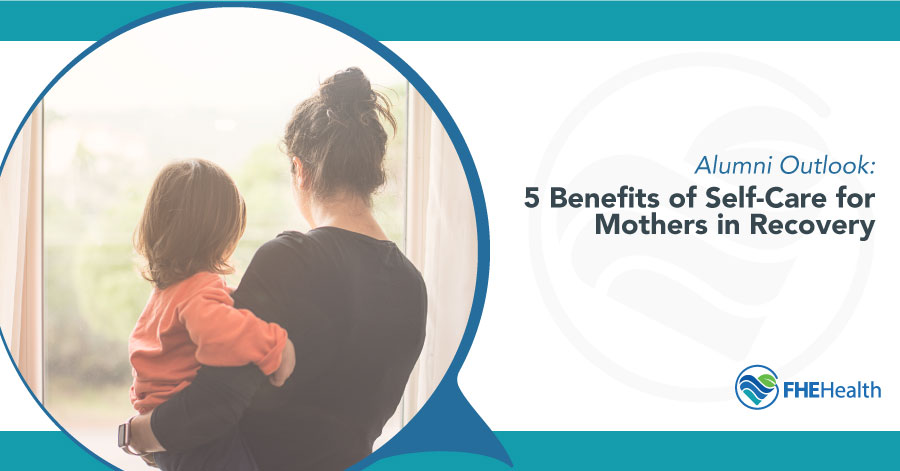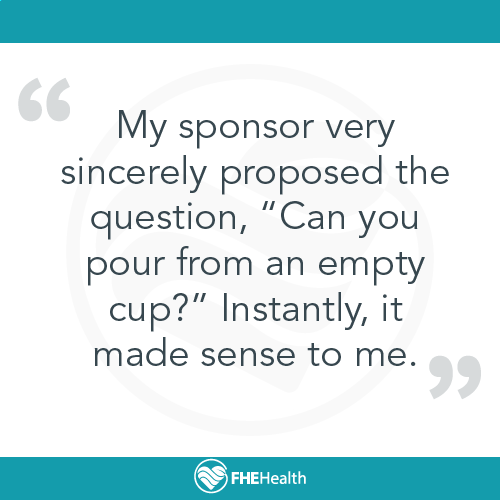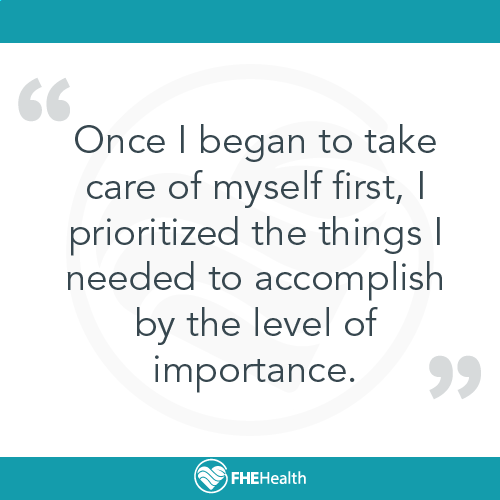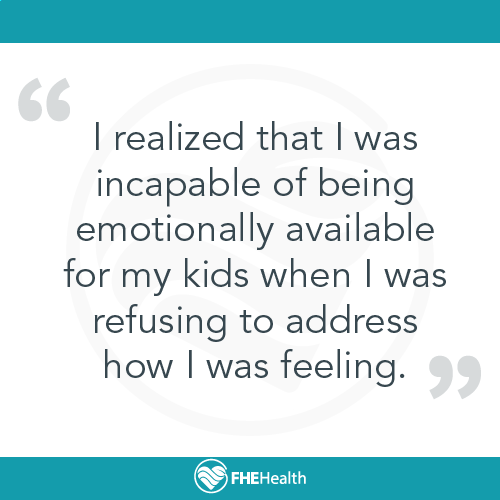
As a mother in recovery, I have had quite the experience of raising two beautiful children while also working a full-time job and maintaining my sobriety. Recovery is full of ups and downs for all of us, and especially adventurous for the mothers in recovery. By nature, mothers are often nurturing, compassionate stressed, and generally neglectful of implementing self-care. I am no exception. I spent the early days in my recovery neglecting self-care and indulging in overcompensating with my children. This ultimately led to a painful but beautiful learning experience for me.
 In early sobriety, we are often told that this is a selfish program. This concept can be quite perplexing as we also learn that in order to stay sober, we are also taught to be selfless. First thing’s first, we must take care of ourselves to be of maximum service to others. I learned this lesson the hard way. I was always masking my discomfort by diving into taking care of everyone else. Over time, I found myself resentful, irritable, restless, and discontent. My sponsor very sincerely proposed the question, “Can you pour from an empty cup?” Instantly, it made sense to me. As an addict/alcoholic in recovery, I often operate in extremes – all or nothing. This old idea had to be demolished. I had to find the balance between taking care of my kids, but first making sure I was mentally, physically, and spiritually well. Here are a few benefits of practicing self-care as a mother in recovery.
In early sobriety, we are often told that this is a selfish program. This concept can be quite perplexing as we also learn that in order to stay sober, we are also taught to be selfless. First thing’s first, we must take care of ourselves to be of maximum service to others. I learned this lesson the hard way. I was always masking my discomfort by diving into taking care of everyone else. Over time, I found myself resentful, irritable, restless, and discontent. My sponsor very sincerely proposed the question, “Can you pour from an empty cup?” Instantly, it made sense to me. As an addict/alcoholic in recovery, I often operate in extremes – all or nothing. This old idea had to be demolished. I had to find the balance between taking care of my kids, but first making sure I was mentally, physically, and spiritually well. Here are a few benefits of practicing self-care as a mother in recovery.
Improved Overall Health
Practicing self-care for mothers in recovery will improve your overall health. Self-care decreases stress and anxiety, thus reducing levels of Cortisol (the stress hormone), and ultimately preventing the breakdown of your body and mind. Increased levels of Cortisol can cause severe health issues such as a decrease in immune functioning, weight gain/loss, increased blood pressure, and even depression. None of the symptoms above are beneficial for anyone, especially those in recovery.
When I first got sober, I didn’t think much about self-care. In fact, I was hyper–focused on the fact that I was no longer drinking and drugging and stressing over learning how to live a healthy life. I binged on unhealthy foods. I didn’t take the time to meditate. I never exercised and certainly didn’t want to look at my emotional sobriety. Eventually, I lost my gratitude, and I found myself spiraling into a pit of depression while I indulged in acting out on my defects. After enough pain, I began to implement a healthy diet, got adequate sleep, spent more time outdoors, and began meditating daily. In turn, I physically felt better and had more energy to spend with my kids. Ultimately, self-care restored my overall health, which improved my time with my children.
More Time
 How often do you hear moms complain about not having enough time in the day? I know I have caught myself saying this often. The truth is, motherhood can be exhausting, and life never seems to slow down. One of the most significant challenges for any individual in recovery is finding balance. As I mentioned before, many of us struggle with the “all or nothing” mentality. Ultimately, it is to our demise when we do not find balance and establish discipline in our daily routines.
How often do you hear moms complain about not having enough time in the day? I know I have caught myself saying this often. The truth is, motherhood can be exhausting, and life never seems to slow down. One of the most significant challenges for any individual in recovery is finding balance. As I mentioned before, many of us struggle with the “all or nothing” mentality. Ultimately, it is to our demise when we do not find balance and establish discipline in our daily routines.
For me personally, I was saying “yes” to many commitments that mandated a “no.” I was the epitome of a people pleaser. This included work commitments, service commitments, favors for friends, and running errands for family members. The truth is, I was entirely responsible for my lack of time. I created an impossible schedule. I created a schedule that allotted no time to take care of myself. I began to get a cold every other week, which ultimately led to a list full of unaccomplished tasks, and I had no idea why. Once I began to take care of myself first, I prioritized the things I needed to accomplish by the level of importance. I found myself with more time to enjoy and execute a disciplined daily routine. Through this process, I began to notice how much more time was freed throughout my week as I became more patient and less anxious when I was spending time with my kids.
Emotional Sobriety and Self Development
 Self-care not only keeps your body healthy, but it also helps to regulate your emotional sobriety as you navigate through early recovery. Emotional sobriety is not a favorite topic amongst those of us in recovery. It can be a painfully daunting process. Most of us drank and used drugs to numb our feelings. When we come into recovery, we are asked to deal with every emotion, but there’s a catch – you have to do it sober. For us moms, parenting is emotionally, physically, mentally, and spiritually taxing. After all, we are responsible for other living, breathing humans.
Self-care not only keeps your body healthy, but it also helps to regulate your emotional sobriety as you navigate through early recovery. Emotional sobriety is not a favorite topic amongst those of us in recovery. It can be a painfully daunting process. Most of us drank and used drugs to numb our feelings. When we come into recovery, we are asked to deal with every emotion, but there’s a catch – you have to do it sober. For us moms, parenting is emotionally, physically, mentally, and spiritually taxing. After all, we are responsible for other living, breathing humans.
Motherhood is the most rewarding and also one of the most important responsibilities ever. Often, we neglect our own feelings through the process of trying to maintain our sobriety while running a household. I had a knack for pretending everything was fine; meanwhile, I was dying on the inside. I was not practicing self-care, and my responsibilities as a mother began to suffer. I realized that I was incapable of being emotionally available for my kids when I was refusing to address how I was feeling. After enough pain, I decided to put myself into therapy. Once a week, I sat down and started to work through the feelings I was neglecting. Through this simple act of self-care, I began to experience the true meaning of emotional sobriety. My emotions no longer ran my life, I pause before reacting, and I genuinely have discovered a sense of who it is I really am and continue to cultivate the woman I want to be.
Gratitude
Finding gratitude is an essential component of addiction recovery. As we get sober, we must learn how to find gratitude in the simplest things in life. After all, discontentment and resentment cannot be present where there is gratitude. When I refuse to take care of myself, I am sending the message that I am not important enough to be taken care of. Ultimately, this creates the perfect storm to begin acting out on old behaviors and becoming the ideal victim. For an alcoholic like me, this is a recipe to drink again.
Throughout my sobriety, I have had many people tell me that gratitude is the key to happiness and wholeness. I have always found myself grateful for my kids, but then I’d drift away into being resentful that my motherly duties defined me. The truth is, I was not making time to take care of myself. Therefore, motherhood did become my identity. Once I committed to hiring a sitter twice a month and taking the time to take care of myself, that resentment began to slip away. As my self-propelled victim mentality began to slip away, I found myself grateful for the many blessings in my life. When you do good, you tend to think and act more positively, and ultimately your overall life improves.
Increased Opportunity to Care for Others
The primary purpose for every recovering alcoholic/addict is to be of maximum service to others. The most important aspect that we often skip over is that we must take care of ourselves first. For instance, if I didn’t implement self-care and left my son for a year, I never would have been any use to him. I was not a good mother when I was not sober. In fact, I was quite the contrary. My insanity had me convinced I was doing it all, but the truth is I was emotionally and sometimes physically utterly unavailable to him. The same goes for us mothers in recovery. If we do not take care of ourselves, we are of no use to others – not even our children.
When we implement self-care, we are able and more willing to take care of others. We are suddenly able to be in a position to be of maximum service to others. Without self-care, we often hold onto resentments and view those we help as “burdens”. Ultimately, to fulfill our calling in recovery – to help others – we must first take care of ourselves.






